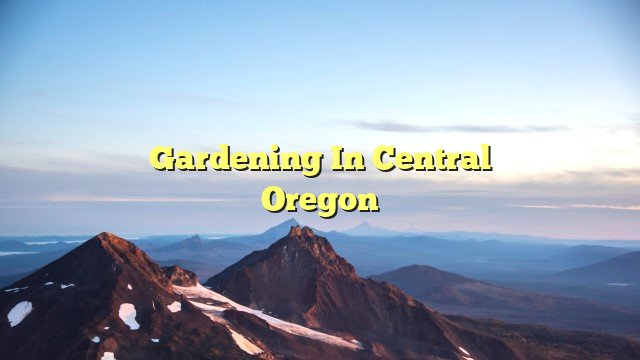Spring is a great time to plan for gardening success
Gardening in central Oregon can be challenging, but with some experience and know-how, you can reap rewards year after year.
So what are the secrets? What does it take to grow a healthy and fruitful garden here in Oregon’s high desert?
With winters being so harsh, not much can be done while it’s dark, cold and snowy. Growing season is relatively short, so once things thaw it’s time to take action. Springtime planning and preparation can increase your chances of success.
Here are some tips to help you get started on the right track:
- Plan your garden: Decide what you want to grow and where you want to plant it. Consider the amount of sunlight your plants will receive and make sure you choose a location that is appropriate for each type of plant.
- Test your soil: Central Oregon soil can be quite alkaline, so it’s important to test your soil to determine its pH level. You can purchase a soil test kit at your local garden center or online. Based on the results of the test, you may need to amend your soil with organic matter or other amendments to adjust the pH level.
- Prepare your soil: Once you have tested your soil, you will need to prepare it for planting. This may include removing rocks and debris, tilling the soil, and adding organic matter such as compost, manure or peat moss.
- Choose appropriate plants: Central Oregon has a unique climate, so it’s important to choose plants that are adapted to the region. Some good options for spring gardening in central Oregon include broccoli, lettuce, peas, spinach, kale, and radishes.
- Consider your watering needs: Central Oregon has a semi-arid climate with low precipitation levels, so it’s important to consider your watering needs when planning your garden. You may want to consider installing a drip irrigation system or using a soaker hose to ensure that your plants receive enough water.
- Protect your plants: Central Oregon is known for its sudden temperature changes and strong winds, which can damage or even kill plants. Consider using protective coverings such as cloths or frost blankets to protect your plants from sudden temperature drops.
Look to professionals for quality supplies and guidance
Local garden centers can be a great source for high-quality gardening supplies, expert advice, and local expertise. Compared to big-box stores or discount retailers, garden centers often carry premium products that are specifically designed for optimal plant growth and health for the region. Additionally, the staff at garden centers are typically knowledgeable about gardening techniques, plant care, and local growing conditions, and can provide expert advice and recommendations to help ensure successful gardening efforts. Furthermore, garden centers often specialize in plants and products that are well-suited for the local climate and growing conditions, which can be especially important in areas with unique growing challenges. Additionally, garden centers typically offer a wide variety of products, making it convenient to get everything you need in one place. By supporting a local garden center, you are also contributing to the local economy and helping to create jobs and support other local businesses and organizations. ????












